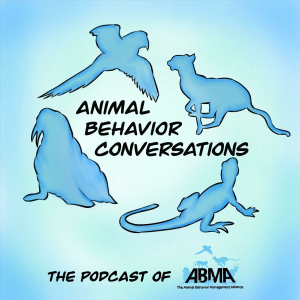
Animal Behavior Conversations: The Podcast of The ABMA
Kids & Family Podcasts
The Animal Behavior Management Alliance (ABMA) strives to spread knowledge throughout the animal care field to help enhance animal care through operant conditioning. Each episode we will discuss a topic in the world of animal care and break down the science of behavior change. To achieve this, the podcast’s host, Shane Gorbett, will interview fellow animal care professionals and experts from across the world to discuss all things training, behavior, enrichment, welfare, and much more! This podcast will be a great resource for all trainers. Let's talk some training and banter about behavior!
Location:
United States
Genres:
Kids & Family Podcasts
Description:
The Animal Behavior Management Alliance (ABMA) strives to spread knowledge throughout the animal care field to help enhance animal care through operant conditioning. Each episode we will discuss a topic in the world of animal care and break down the science of behavior change. To achieve this, the podcast’s host, Shane Gorbett, will interview fellow animal care professionals and experts from across the world to discuss all things training, behavior, enrichment, welfare, and much more! This podcast will be a great resource for all trainers. Let's talk some training and banter about behavior!
Language:
English
Website:
https://www.theabma.org
74: The Behaviors of Leadership at Any Level - A Live Panel Recording from the ABMA 2025 Virtual Conference
Duration:01:44:02
73: Pets For Vets - ABMA's 2025 Premier Sponsor
Duration:00:55:03
72: Getting "Unstuck" in Training with Ryan Cartlidge, Animal Training Academy (ATA)
Duration:01:38:24
71: The Behaviors of a Unified and Supportive Team - Part 2 with Dave O'Connell, Bearizona
Duration:01:12:30
70: Chaining & Behavior Chains with Justin Garner, Busch Gardens Tampa Bay
Duration:00:42:46
69: Changing Conditions to Change Motivation - Part 2 with Wouter Stellaard, Behavior 360 & The Kuzo Group
Duration:00:59:55
68: Changing Conditions to Change Motivation - Part 1 with Wouter Stellaard, Behavior 360 & The Kuzo Group
Duration:01:18:07
67: Get Out of the Way and Let Behavior Happen with Ari Bailey, Natural Encounters, Inc.
Duration:01:10:46
66: Hierarchy of Behavior Change Procedure and Other Behavior Topics with Dr. Susan Friedman, Behavior Works
Duration:01:36:17
65: Recap of the 2025 ABMA Annual Conference in Galveston, Texas, United States with Marie Filipe, Heidi Moomaw, Benjamin Fainted, Matthew Nguyen, & Li Shan Tan
Duration:01:10:22
64: The Importance of Behavior in Modern Animal Care - A Live Panel Recording at the 2025 Annual Conference with panelist Tim Sullivan, Elly Neumann, Nicki Boyd, Anaka Nazareth, and Chris Jenkins
Duration:00:58:07
63: Training on the Continuum: Moving Away from Coercion and Towards Genuine Choice with Steve Martin, Natural Encounters, Inc.
Duration:01:11:48
62: Motivation and its Affect on Behavior with Mel Painter & Alyse State, Georgia Aquarium
Duration:01:09:24
61: Fading with Shane Gorbett, Philadelphia Zoo
Duration:00:51:20
60: Primary/Unconditioned & Secondary/Conditioned Reinforcers with Tricia Dees, Second Vice President of The ABMA
Duration:00:42:04
59: Reinforcers and Punishers with Shawna Spencer, Coral World Ocean Park
Duration:01:10:32
58: Superstitious Behavior with Jose Bello, Disney's Animals, Science and Environment
Duration:00:38:06
57: Training and Behavior in a Research Setting with Jonelle Mason, California National Primate Research Center - UC Davis
Duration:00:43:58
56: The Modern Zookeeper and the Importance of Redefining What We Do with Sam Meinke, Palm Beach Zoo
Duration:00:54:45
55: A Free Operant Approach to Behavior Management with Rick Hester, Cheyenne Mountain Zoo & BehaviorWorks
Duration:00:51:43